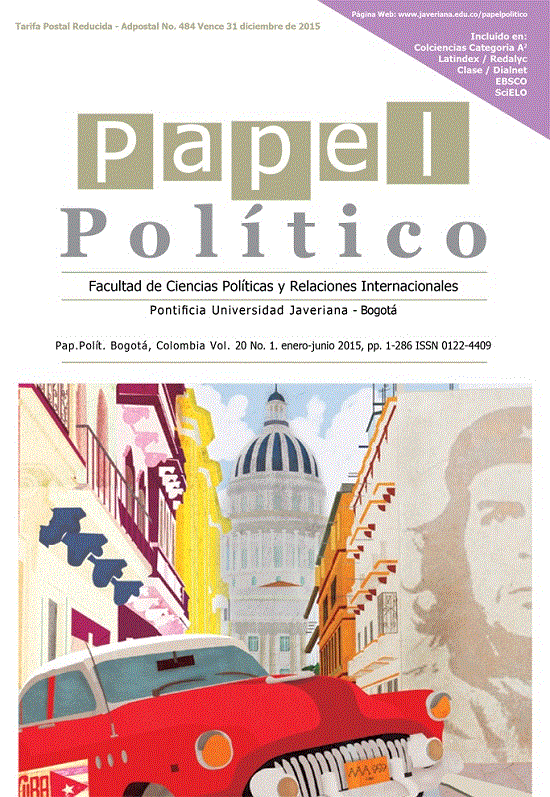Resumen
El sociólogo estadounidense Joseph Kahl (1988),solía decir que en América Latina los profesorese investigadores de la sociología se dejaron llevarpor el fervor revolucionario de los estudiantes yempezaron a utilizar amplias teorías que permitieranentender las razones del atraso de AméricaLatina, en lugar de dedicarse al estudio detalladode casos accesibles para llegar a una realidad másamplia. De esta antigua tradición, surgieron dostendencias (Bryant, 2003) que parecen tener unaamplia aceptación a nivel regional: la tendenciaa defender el libre mercado como si fuera alguna especie de dogma incuestionable y la tendencia aatacarlo como si fuera una especie de enfermedadcon la cual estamos obligados a vivir. A nivelacadémico esto ha mostrado visos claros. Algunosautores de ambos bandos y con un soporteargumentativo bastante débil (Mendoza, 2012;Trentmann, 1998) han aprovechado la inherentefalencia conceptual de gran parte de estos discursosde economía política para reforzar susideologizados argumentos. Y consecuentementecon esto, dentro del discurso encaminado aatacar el libre mercado por cualquier medioposible, académicos y políticos han incurrido enla tendencia de compilar dentro de una especiede saco teórico conceptos como la reduccióndel Estado, la filosofía del neoliberalismo einstituciones como el FMI y el Banco Mundial,bajo el supuesto de que todos se encuentran encompleta armonía y acuerdo. Esta tendencia depensamiento está sustentada por el conceptode colonización interna del sociólogo mexicanoPablo González Casanova (Kahl 1988). A esteinmenso e indigerible potaje conceptual se leconoce actualmente bajo el nombre de Consensode Washington. Sin embargo, si se analiza concuidado cada uno de estos elementos, con facilidadse puede encontrar que entre todos estosconceptos, en algunos casos, existe una relaciónmuy débil y, en algunos otros, incluso, hay clarascontradicciones. El presente artículo tiene laintención de poner un poco de claridad sobreeste tema por medio de una revisión histórica yteórica sobre tres conceptos que han generadouna gran polémica dentro del continente. Coneste objetivo, primero se harán algunas consideracionesconceptuales, después se revisará lahistoria del FMI, luego se revisará el supuestoactual que se tiene sobre la reducción del Estado y se establecerá su relación con el pensamientoneoliberal –principalmente de su mayor promotor,Milton Friedman– y su idea original sobrela no intervención. Acto seguido, se revisará lahistoria del Consenso de Washington y se haránlas comparaciones correspondientes entre lostres elementos por medio una tabla comparativa.Al final, se presentarán algunas conclusiones.Esta revista científica se encuentra registrada bajo la licencia Creative Commons Reconocimiento 4.0 Internacional. Por lo tanto, esta obra se puede reproducir, distribuir y comunicar públicamente en formato digital, siempre que se reconozca el nombre de los autores y a la Pontificia Universidad Javeriana. Se permite citar, adaptar, transformar, autoarchivar, republicar y crear a partir del material, para cualquier finalidad (incluso comercial), siempre que se reconozca adecuadamente la autoría, se proporcione un enlace a la obra original y se indique si se han realizado cambios. La Pontificia Universidad Javeriana no retiene los derechos sobre las obras publicadas y los contenidos son responsabilidad exclusiva de los autores, quienes conservan sus derechos morales, intelectuales, de privacidad y publicidad.
El aval sobre la intervención de la obra (revisión, corrección de estilo, traducción, diagramación) y su posterior divulgación se otorga mediante una licencia de uso y no a través de una cesión de derechos, lo que representa que la revista y la Pontificia Universidad Javeriana se eximen de cualquier responsabilidad que se pueda derivar de una mala práctica ética por parte de los autores. En consecuencia de la protección brindada por la licencia de uso, la revista no se encuentra en la obligación de publicar retractaciones o modificar la información ya publicada, a no ser que la errata surja del proceso de gestión editorial. La publicación de contenidos en esta revista no representa regalías para los contribuyentes.


